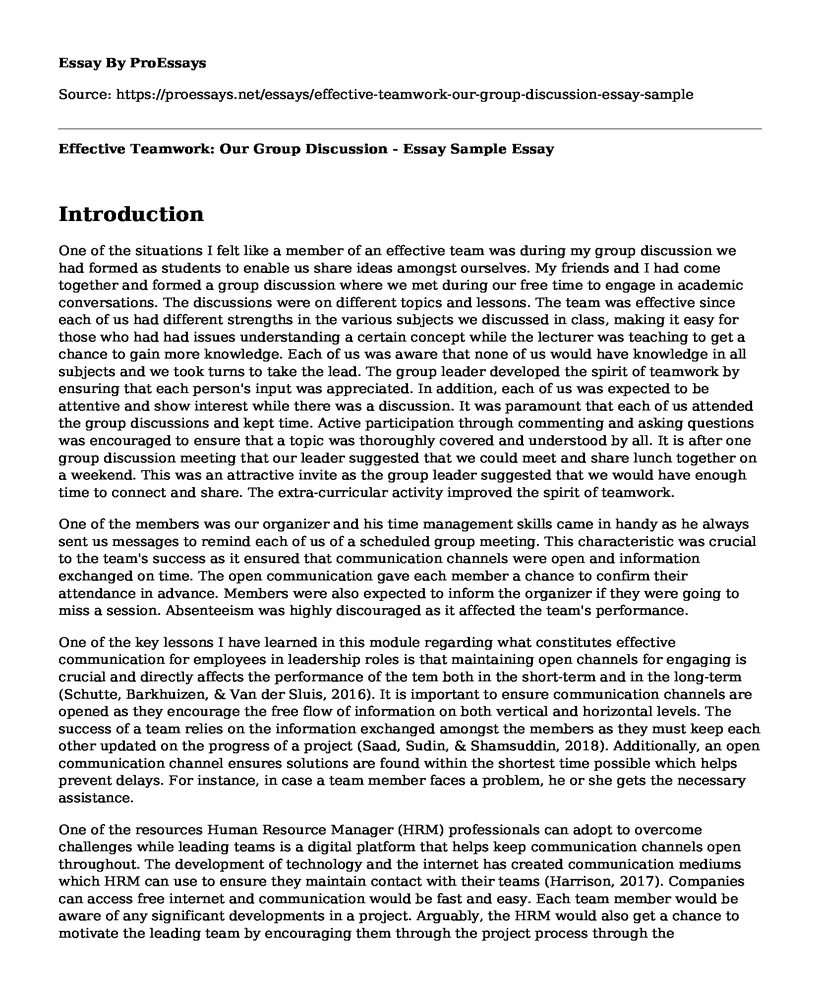Introduction
One of the situations I felt like a member of an effective team was during my group discussion we had formed as students to enable us share ideas amongst ourselves. My friends and I had come together and formed a group discussion where we met during our free time to engage in academic conversations. The discussions were on different topics and lessons. The team was effective since each of us had different strengths in the various subjects we discussed in class, making it easy for those who had had issues understanding a certain concept while the lecturer was teaching to get a chance to gain more knowledge. Each of us was aware that none of us would have knowledge in all subjects and we took turns to take the lead. The group leader developed the spirit of teamwork by ensuring that each person's input was appreciated. In addition, each of us was expected to be attentive and show interest while there was a discussion. It was paramount that each of us attended the group discussions and kept time. Active participation through commenting and asking questions was encouraged to ensure that a topic was thoroughly covered and understood by all. It is after one group discussion meeting that our leader suggested that we could meet and share lunch together on a weekend. This was an attractive invite as the group leader suggested that we would have enough time to connect and share. The extra-curricular activity improved the spirit of teamwork.
One of the members was our organizer and his time management skills came in handy as he always sent us messages to remind each of us of a scheduled group meeting. This characteristic was crucial to the team's success as it ensured that communication channels were open and information exchanged on time. The open communication gave each member a chance to confirm their attendance in advance. Members were also expected to inform the organizer if they were going to miss a session. Absenteeism was highly discouraged as it affected the team's performance.
One of the key lessons I have learned in this module regarding what constitutes effective communication for employees in leadership roles is that maintaining open channels for engaging is crucial and directly affects the performance of the tem both in the short-term and in the long-term (Schutte, Barkhuizen, & Van der Sluis, 2016). It is important to ensure communication channels are opened as they encourage the free flow of information on both vertical and horizontal levels. The success of a team relies on the information exchanged amongst the members as they must keep each other updated on the progress of a project (Saad, Sudin, & Shamsuddin, 2018). Additionally, an open communication channel ensures solutions are found within the shortest time possible which helps prevent delays. For instance, in case a team member faces a problem, he or she gets the necessary assistance.
One of the resources Human Resource Manager (HRM) professionals can adopt to overcome challenges while leading teams is a digital platform that helps keep communication channels open throughout. The development of technology and the internet has created communication mediums which HRM can use to ensure they maintain contact with their teams (Harrison, 2017). Companies can access free internet and communication would be fast and easy. Each team member would be aware of any significant developments in a project. Arguably, the HRM would also get a chance to motivate the leading team by encouraging them through the project process through the communication medium. For instance, a HRM can create a group chat on one of the available social media channels to engage with the leading team. Facebook is one of the resources a HRM can use to overcome the challenge of communication with the leading team.
References
Harrison, A. E. (2017). Exploring millennial leadership development: An evidence assessment of information communication technology and reverse mentoring competencies. Case Studies in Business and Management, 4(1), 25-48.
Saad, Z. M., Sudin, S., & Shamsuddin, N. (2018). The influence of leadership style, personality attributes and employee communication on employee engagement. Global Business and Management Research, 10(3), 743.
Schutte, N., Barkhuizen, N., & Van der Sluis, L. (2016). The development of a human resource management (HRM) professional competence model: A pilot study. Journal of Psychology in Africa, 26(3), 230-236.
Cite this page
Effective Teamwork: Our Group Discussion - Essay Sample. (2023, Apr 23). Retrieved from https://proessays.net/essays/effective-teamwork-our-group-discussion-essay-sample
If you are the original author of this essay and no longer wish to have it published on the ProEssays website, please click below to request its removal:
- Teamwork in Health Care
- Essay Example on Social Stratification: Who Gets Access to Resources?
- Essay Sample on Manpower Selection: Crucial for Project Success
- Decision Making Systems: How Technology Enhances Benefits - Essay Sample
- Essay Sample on Two Heads: Improving Online Grant Portal for Equity
- Leadership Philosophy and Attributes - Paper Example
- Essay Sample: Exploring Ethical Dimensions in Technical Communication and Workplace Leadership







